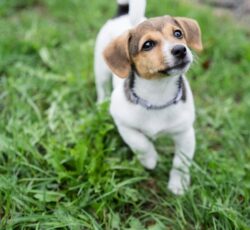New Puppy Training
 Bringing home a new puppy is an exciting and joyful experience. However, it comes with the responsibility of training your furry friend. Proper training is essential to ensure your puppy grows into a well-behaved and happy dog. In this blog post, we will provide a comprehensive guide to new puppy training, covering important aspects such as crate training, housebreaking, basic commands, and socialization.
Bringing home a new puppy is an exciting and joyful experience. However, it comes with the responsibility of training your furry friend. Proper training is essential to ensure your puppy grows into a well-behaved and happy dog. In this blog post, we will provide a comprehensive guide to new puppy training, covering important aspects such as crate training, housebreaking, basic commands, and socialization.
Crate Training
Crate training is an important aspect of puppy training as it provides a safe and comfortable space for your puppy and helps with establishing a routine. Start by choosing an appropriate crate size that allows your puppy to stand, turn around, and lie down comfortably. Introduce your puppy to the crate gradually, using positive reinforcement such as treats and praise. Encourage your puppy to enter the crate willingly, and gradually increase the time spent inside. Ensure the crate is associated with positive experiences, such as feeding and nap times. Crate training helps with housebreaking and prevents destructive behaviors when you’re unable to supervise your puppy.
Housebreaking
Housebreaking, or potty training, is a crucial part of new puppy training. Consistency and patience are key to successful housebreaking. Establish a regular schedule for feeding, and take your puppy outside to eliminate shortly after meals. Choose a specific spot for outdoor potty breaks, and always reward your puppy with treats and praise when they go in the appropriate place. Keep an eye on your puppy’s behavior and take them outside whenever you notice signs of needing to eliminate, such as sniffing or circling. Accidents will happen, but remain patient and avoid punishment. Positive reinforcement and consistency will help your puppy associate outdoor elimination with rewards, encouraging good habits.
Basic Commands
Teaching your puppy basic commands not only establishes a line of communication but also helps with behavior management and safety. Start with simple commands like “sit,” “stay,” and “come.” Use positive reinforcement, rewards, and repetition when introducing these commands. For example, when teaching “sit,” hold a treat above your puppy’s head and slowly move it back. Your puppy will naturally sit down to follow the treat and receive praise and a reward. Practice these commands in various settings and gradually increase distractions. Remember to keep training sessions short and fun, ending on a positive note. Consistency and patience are key when teaching basic commands, and with time, your puppy will learn to respond reliably.
Socialization
Socialization is an essential aspect of new puppy training as it helps your puppy become well-adjusted and comfortable in various environments and social situations. Introduce your puppy to different people, animals, sounds, and environments from an early age. Arrange playdates with other puppies or well-behaved adult dogs to help your puppy learn appropriate social skills. Gradually expose your puppy to new experiences, such as car rides, walks in busy areas, and interacting with different people. Ensure these experiences are positive and reward your puppy for calm and confident behavior. Socialization is an ongoing process that should continue throughout your puppy’s life to prevent fear or aggression towards unfamiliar situations.
Preventing Destructive Behaviors
Puppies are naturally curious and may engage in destructive behaviors, such as chewing on furniture, shoes, or other household items. To prevent these behaviors, provide appropriate chew toys and teach your puppy what is acceptable to chew on. Whenever you catch your puppy chewing on something inappropriate, redirect their attention to a chew toy and provide praise when they engage with it. Puppy-proofing your home is also important to prevent access to hazardous or valuable items. Crate training can be helpful when you’re unable to supervise your puppy. Remember, patience and consistency are key in preventing destructive behaviors, and positive reinforcement will encourage your puppy to make the right choices.
Obedience Classes and Professional Training
Consider enrolling your puppy in obedience classes or seeking professional dog training to enhance your training efforts. Obedience classes provide structured learning environments and socialization opportunities for both you and your puppy. Trained instructors can guide you through training techniques and address specific behavior challenges. Professional trainers can also provide personalized training sessions tailored to your puppy’s specific needs. Their expertise can help address any behavioral issues and ensure that your puppy receives the best training possible.
Conclusion
New puppy training is an important responsibility that sets the foundation for a well-behaved and happy dog. Crate training, housebreaking, teaching basic commands, socialization, and preventing destructive behaviors are all essential aspects of training a new puppy. With consistency, patience, and positive reinforcement, you can establish good habits and create a strong bond with your furry friend. Consider enrolling in obedience classes or seeking professional training to enhance your training efforts. Remember, the key to successful training is to make it a positive and enjoyable experience for both you and your puppy.
